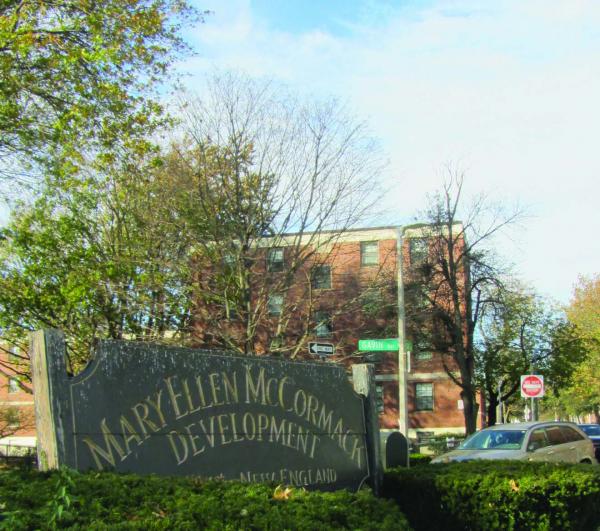November 22, 2017

The process has begun to totally rehabilitate the Mary Ellen McCormack complex in South Boston. Jennifer Smith photo
The Boston Housing Authority’s oldest development, the Mary Ellen McCormack complex in South Boston, is slated to be converted to a 3,000-unit, modern, mixed-income, mixed-use community in a $1.6 billion renovation that could take up to a decade to complete.
“The planning process is beginning in earnest,” Kate Bennett of the Boston Housing Authority (BHA) told attendees at the Columbia-Savin Hill Civic Association’s meeting this month. Community forums will start soon, she said, ideally with the input from residents of nearby South Boston and Dorchester neighborhoods.
Boston-based WinnDevelopment Company, LP, was selected in August to develop the 27-acre site, according to the BHA. All existing buildings, which today include 1,016 deeply subsidized apartments and row houses, will be demolished and replaced. The public housing units will be rebuilt, along with an additional 2,000 middle-income apartments, and market-rate apartments and condominiums.
Chief executive Gilbert Winn said the company hopes to accomplish three things over the course of the process: “There’s an improved situation at Mary Ellen McCormack; that there are jobs for people who live there; and that there is a substantial middle-income housing component.”
Mary Ellen McCormack, also known as “Old Harbor” to longtime South Boston residents, is located on Kemp Street, opposite Carson Beach. The 1930s complex – 22 three-story buildings and 152 row houses – offers a mix of one-, two-, and three-bedroom apartments with rents calculated at 30 percent of a resident’s income or established as flat rent.
Winn told attendees that one-third of the new units will be designated to very low income, middle-income, and market rate residents, with the first priority being the protection of the BHA’s most subsidized spaces. They are looking at a townhouse-inspired design around the site, he said.
City housing officials “have been searching for a way to invest in that site for some time now,” Bennett said. “We don’t have the capital or operating money that we need to properly invest in that site and maintain it at the level that we would like to and that our residents deserve, our neighborhood deserves.”
A public-private partnership seemed to be the best solution, Bennett said. The WinnDevelopment plan was one of five applications that BHA received in response to a request for proposals for the redevelopment this spring. According to a BHA release, “The Winn team received high points from the selection committee for its demonstrated model for strong resident partnerships and robust resident services, items which are a priority for existing residents at the site.”
Adding the market-rate units is a way to leverage the value of their land and create mixed-income housing “across that whole spectrum,” Bennett said, assuring attendees that there will be no loss in quality for the subsidized units. Existing residents will have the right to return to the site after redevelopment and the BHA will retain ownership of the land.
The development will take place over four phases, according to the BHA. Winn said they hope to avoid disruption as long as possible through the phased building plan, but residents will be offered relocation options, including moves to other BHA public housing sites or Housing Choice/Section 8 vouchers.
WinnDevelopment specializes in affordable housing and mixed income housing, and “managing complex projects,” Winn said. Most of their properties have been with the company for the past 30 years, he said. “We’re sort of the opposite of the merchant builder who goes in and flips the building and sells it to a cash builder.” The developers will be hosting office hours for neighbors and community groups throughout the process, he said.
“We want to engage in a listening tour and have a lot of public forums to sort of ask folks what they think the vision of the site should be,” Bennett said. “At the BHA, our first constituency is obviously our residents, but pretty quickly we’ll need to bump out and talk to neighborhood associations like this one and ones that are surrounding the development.”
About half the buildings will have a first-floor retail element, Winn said, such as a neighborhood market and other local amenities like dry cleaning and repair shops. Event space would also be available to the McCormack and the surrounding community.
“There are no set-in-stone plans right now,” he said. “We know this is a high profile project that’s going impact the lives of people in this room, but we also know that we really can’t wait. We believe strongly that [with] the social issues that are going on, the physical condition of the Mary Ellen McCormack, that’s something that we can’t wait to work on.”


